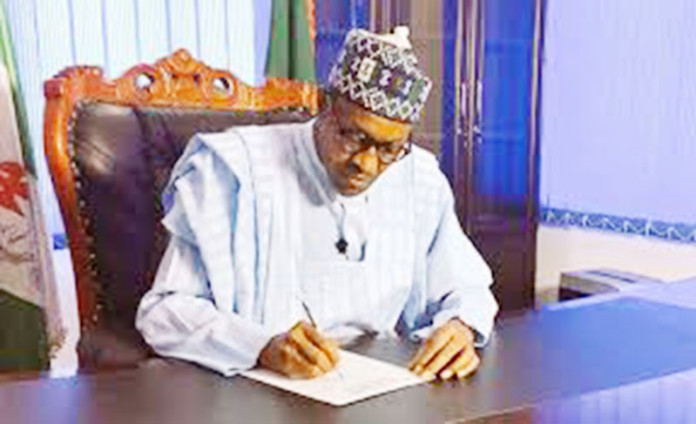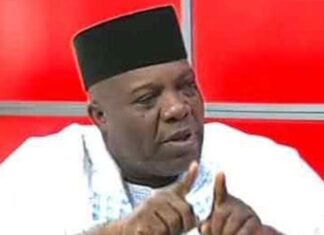A monthly poll tracking the performance of governments at all levels in Nigeria, and providing feedback from the public to their elected officials, has recorded President Muhammadu Buhari’s first major approval rating slide.
The February survey by Governance Advancement Initiative for Nigeria (GAIN) said more Nigerians for the first time since December 2015 scored Mr. Buhari low on jobs, economy, and power.
In earlier months, the poll found that majority of respondents did not blame President Buhari for Nigeria’s current economic troubles. They blamed former president Goodluck Jonathan instead.
The trend however shifted significantly in February as the nation’s economic crisis bit harder, in what the poll coordinators said suggested the president’s “honeymoon” might have ended.
“The survey was administered using electronic media between February 22nd and 29th, 2016. A total of 757 complete responses were received. The survey results have a 4% margin of error at a 95% confidence level,” said Malcolm Fabiyi, one of the poll’s coordinators, who previously served as a visiting professor at the Lagos Business School.
The February result showed that Mr. Buhari’s approval rating dropped from 63.4% in January to 32.8%, and more Nigerians held the president responsible for the struggling economy for the first time.
The President scored low on jobs, economy, power and rule of law. A huge 79 per cent of respondents rated as poor the government’s handling of recurring clashes between herdsmen and farmers.
The poll also found that the Nigerian Senate maintained the lowest approval rating of all government institutions. The army was the highest rated national institution.
Respondents also rated Ibeh Kachikwu, the minister of state for petroleum, as Nigeria’s best minister so far.
Here are key highlights of the poll
– Buhari government scores low on jobs, economy, power
– More Nigerians hold Buhari responsible for the economy
– Overall approval for the Buhari government declines
– Nigerian Senate maintains lowest approval rating of government institutions
– Nigerian Army remains highest rated national institution
– Kachikwu rated best performing minister
– Concerns about abuse of rule of law grows
– Majority hold negative view of the selection of Ali Modu Sherriff as the PDP Chairman
– 79% give poor rating to government’s handling of Fulani herdsmen clashes
– 72% of Nigerians do not support any political parties
Buhari government overall approval rating declines
We saw the sharpest decline in the month-to-month approval ratings for the president yet in our polls. High approval ratings dropped from 63.4% in January to 32.8% in the February poll. Overall, a slight majority of Nigerians (50.4%) gave the Buhari administration average (17.6%) or high approval ratings (32.8%).
As with previous polls, we provided respondents with a 5 point-scale response to this question. We maintained our approach of not using a simple forced two-scale measure of approval (Yes or No) to enable a deeper understanding of the nuances that informed respondents’ choices.
A positive approval rating in our terminology refers only to those respondents that reported either an “Excellent” or “Good” rating. A negative rating comprises of those individuals that reported a “Poor” or “Very Poor” rating.
Security, Anticorruption, Power and the Economy are priority areas
Respondents were provided with a number of key segments and focus areas for the government and were required to provide a forced three tier ranking (High, Medium, Low) of their perceptions of the importance of each of the areas.
Under the “High” ranking response, security (Boko Haram Crisis) was rated as the most important area of concern and/or interest by 55% of Nigerians, continuing the trend from the January poll. The top 5 rated areas overall were Security (55%), Anti-Corruption (51%), Power (51%), Economy & Jobs (50%) and Education (45%).
Anticorruption war remains popular, but concerns grow over abuse of rule of law
Support for the anti-corruption war dropped from about 76% in the January poll, to just under 45% in this poll. We also saw an increase in the number of Nigerians that are critical of the way the anti-corruption war is being prosecuted. More Nigerians indicated that the anti-corruption war targets the president’s political opponents (34.4% in February vs 15.5% in January) and opposition PDP members (33.1% in February vs 16.8% in January). Those expressing concern about the potential for abuse of the rule of law in the prosecution of corruption cases increased from 21.5% in the January poll to 35.3% in February.
It is not clear why this shift in the support for the anticorruption war has occurred. Future polls will include questions aimed at better understanding the basis for this shift.
Anticorruption and Security remain bright spots; Nigerians score government low on economy, housing, healthcare, education and power.
The government received low ratings from majority of respondents in six of the nine areas surveyed. The worst ranked areas were Housing (74%), Economy & Jobs (73%), Healthcare (62%), Transportation (62%), Power (59%) and Education (58%).
Combining “High” and “Medium” ratings, the three highest ranked areas are Anticorruption (75%), Security (70%) and Availability of Petroleum Products (60%).
Majority of Nigerians are against devaluation of the Naira
A majority of Nigerians (62.6%) indicated opposition to the devaluation of the Naira. While this position is popular, most economists have indicated that the Buhari’ government’s defense of the Naira is not sustainable in the long run given the lack of sufficient reserves to offset the dollar deficit that has led to downward pressures on the value of the Naira.
-PremiumTimes












